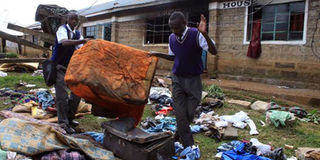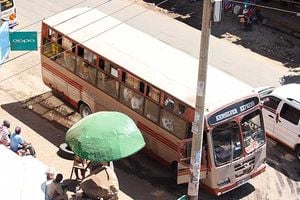The role of curriculum in addressing student unrest in Kenya

Students of Watuka Secondary School after a dormitory at the institution was burnt down on July 26, 2016. For the past few weeks, Kenyan boarding secondary schools have witnessed an unprecedented and alarming increase in suspected arson attacks that have mostly targeted dormitories. PHOTO | JOSEPH KANYI | NATION MEDIA GROUP
What you need to know:
- The curriculum is an overriding factor for children’s being in school, hence the attention.
- These fires are coming at a time when most schools across the country are preparing candidates for main examinations by offering them trial examinations.
- It is, therefore, imperative that the role of the curriculum in addressing unrest be given focus.
For the past few weeks, Kenyan boarding secondary schools have witnessed an unprecedented and alarming increase in suspected arson attacks that have mostly targeted dormitories.
Previously, student unrests involved boycotts and marches to education offices. This latest trend has caught public attention, with diverse views pointing to bigger problems affecting our schools.
The education sector is once again in the lime light, with everyone searching for answers. As the search continues, so does the burning.
Although cases of indiscipline are not unique to Kenyan schools, the nature of indiscipline cases being witnessed as well as their seemingly coordinated spread is a negative trend that threatens our future.
John Gikunda conducted a study in 2012 to establish strategies of dealing with school unrest in Kenyan secondary schools. He established that among the reasons for the unrest were drug abuse, indiscipline, leadership issues, as well as curriculum and examination problems.
The curriculum is an overriding factor for children’s being in school, hence the attention.
These fires are coming at a time when most schools across the country are preparing candidates for main examinations by offering them trial examinations.
It is, therefore, imperative that the role of the curriculum in addressing unrest be given focus.
PLANNED EXPERIENCE
The curriculum is a planned experience of what the state expects students to learn. The formal curriculum thus addresses what students learn and how they engage with the material.
The relationship between curriculum and student unrest is a knowledge gap that still requires in-depth understanding. The relationship is likely multi faceted; from effective curriculum design and development to effective curriculum implementation. For instance, poor syllabus coverage and content organisation and an attempt to cover what remains within a short time in term II can create a lot of pressure on the students, making them snap.
The other issue is emphasis on rote learning at the expense of ‘real’ learning. A good curriculum ought to emphasise less on content specifics but on how students engage with the content. In reviewing this curriculum, experts need to focus on getting it right from the beginning. We must think about inculcating practical and high order thinking skills in the design of the curricula.
This must be followed by inquiry-based constructivist teaching methodologies in class, which must then be reflected in the testing.
We must avoid a curriculum that lays emphasis on exams at the expense of the method. A curriculum that places emphasis on teaching for exams partly accounts for the reason that some students who perform well in primary exams find it hard to cope at secondary level, which is a little more demanding in producing written answers as opposed to mere choice of options.
The focus should be on what is useful to learners outside the gate of the school.
VERY GOOD IDEAS
At its inception, the 8-4-4 system of education had very good ideas. There were subjects at primary schools like art & craft, music, and home science that lay emphasis on practical skills like sewing, singing and baking, respectively.
This was in cognisance of the fact that children have different ways of understanding. While one child may better understand through hearing, others understand through pictures and manipulating objects among other ways. These are skills that are practical essentials in the day-to-day life of an individual.
Anyone who went through such practical training would easily fix a hem, make simple meals and do many other practical tasks. With time, the subjects ceased to be examined, changing focus to examinable subjects and finally to just high scores in examinations. This focus on passing at whatever expense is ‘killing’ our system. Children have been turned to robots, hardly having time to play and interact. Could this focus on scores be causing our children to snap?
It is said that too much work and no play makes Jack a dull boy. Imagine exposing learners to a lot of memorisation from Monday to Friday for several weeks; their brain becomes bogged down but with very little information retained. This can contribute to tension among learners. A curriculum must, thus, be effectively implemented as the major factor that could mitigate student unrests in schools.
Dr Okoth-Oluoch is a lecturer at Masinde Muliro University and a specialist in Teacher education and Curriculum Development




